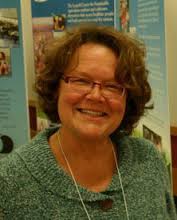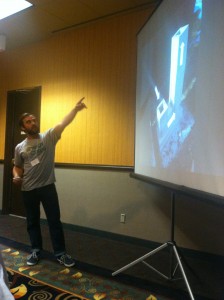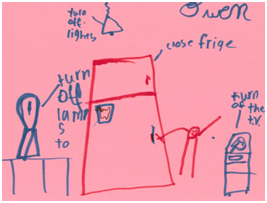Read about Amy Luebbert’s thoughts after a Regional Food Systems Working Group meeting:
Wait! What did she say!? Did I hear her right?
 There she was Laura Krouse, a farmer from Mount Vernon Iowa, who owns Abbe Hills Farm. As the keynote speaker at the Regional Food Systems Working Group Spring Meeting in Des Moines on March 14th, Laura was charged with bringing the perspective of farmers on current food policies. And boy did she bring it!
There she was Laura Krouse, a farmer from Mount Vernon Iowa, who owns Abbe Hills Farm. As the keynote speaker at the Regional Food Systems Working Group Spring Meeting in Des Moines on March 14th, Laura was charged with bringing the perspective of farmers on current food policies. And boy did she bring it!
Sitting in a room full of mostly strangers, I sat there cheering (internally, of course) and grinning ear to ear because everything she said touched me at my core. It seemed she had made so many connections that most people tend to overlook and her no-nonsense demeanor made me undeniably happy.
As preparation for her presentation, she talked with 30 of her fellow Iowan farmers about what policies were of importance to them. And here is where my eyes widened and I said “what!?”
First, very first, on her list was climate change/resiliency!! Yes! That is what we need to deal with first, thank you Laura Krouse for speaking out about this critical issue and how farmers are impacted and play a role. Next on her list – energy costs/carbon footprint! She’s two for two! She gave an example of how she is handling these challenges on her farm. Laura has a hoop house where she planted tulip bulbs to sell at a Farmers Market (along with her veggies) come later this spring. To live, the tulips need water, but due to the extremely low temperatures in Iowa this past winter the frost line dropped below the normal 48 inches resulting in frozen water lines. To save the tulips (and her financial investment) she carried in hundreds of pounds of wet snow from outside and laid it on top of the beds.  She said “I had installed a low carbon technology (the hoop house) to extend the growing season and due to erratic weather I am struggling to use it without creative solutions. Hopefully, this will provide enough moisture to start them growing – and the next time they need water, the water line to the hoophouse and chicken pen will be thawed out.” Without the ability to moderately predict weather patterns farmers lose what little control they do have over their livelihoods. This isn’t only impacting farmers in Iowa; it is impacting farmers all over the world.
She said “I had installed a low carbon technology (the hoop house) to extend the growing season and due to erratic weather I am struggling to use it without creative solutions. Hopefully, this will provide enough moisture to start them growing – and the next time they need water, the water line to the hoophouse and chicken pen will be thawed out.” Without the ability to moderately predict weather patterns farmers lose what little control they do have over their livelihoods. This isn’t only impacting farmers in Iowa; it is impacting farmers all over the world.
She continued to dominate all things awesome for the remainder of her presentation hitting on the need for more farmers, access to trainings, promoting organic farming and educating consumers about seasonality of foods. One thing she repeated over and over was “without farmers there is no food, it is as simple as that”. It is as simple as that. We need to listen to farmers like Laura more often.
She jovially invited those of us in the room to use our free time to tackle these not-so-small issues: create a directory of where to purchase local foods in the state of Iowa, start a few (or lots of) food hubs around the state, work on policies to allow easier access to sell local foods in schools, and invest in business expansion navigators that will help farmers navigate policies/bureaucracies. She knows these are no small tasks, but they are important and need attention to move things forward. Maybe you don’t live in Iowa, but my guess is that your state could use someone working on these issues too… maybe that someone is you?
I left feeling inspired and grateful that I had chosen to spend my morning with this group of folks working towards building a better food system in Iowa. Laura is a force to be reckoned with and I look forward to visiting with her more when I visit Abbe Hills Farm later this month.
 Amy Luebbert has a B.A. in Geography with a minor in Anthropology. She volunteered in Des Moines, IA as a community organizer with Oxfam America from 2011-2013. This experience offered her the opportunity to lobby on behalf of small scale farmers around the world, engage and inform the public on issues of hunger and poverty, organize events, manage volunteers and develop a social media presence for their local group. Amy has seven years of experience in the corporate world and is excited to have the opportunity to pursue a career more in line with her passions. Amy serves with HACAP to promote energy efficiency and conservation through public trainings. She assists in energy-related certification presentations and educate residents about heating system maintenance and general energy conservation education.
Amy Luebbert has a B.A. in Geography with a minor in Anthropology. She volunteered in Des Moines, IA as a community organizer with Oxfam America from 2011-2013. This experience offered her the opportunity to lobby on behalf of small scale farmers around the world, engage and inform the public on issues of hunger and poverty, organize events, manage volunteers and develop a social media presence for their local group. Amy has seven years of experience in the corporate world and is excited to have the opportunity to pursue a career more in line with her passions. Amy serves with HACAP to promote energy efficiency and conservation through public trainings. She assists in energy-related certification presentations and educate residents about heating system maintenance and general energy conservation education.








